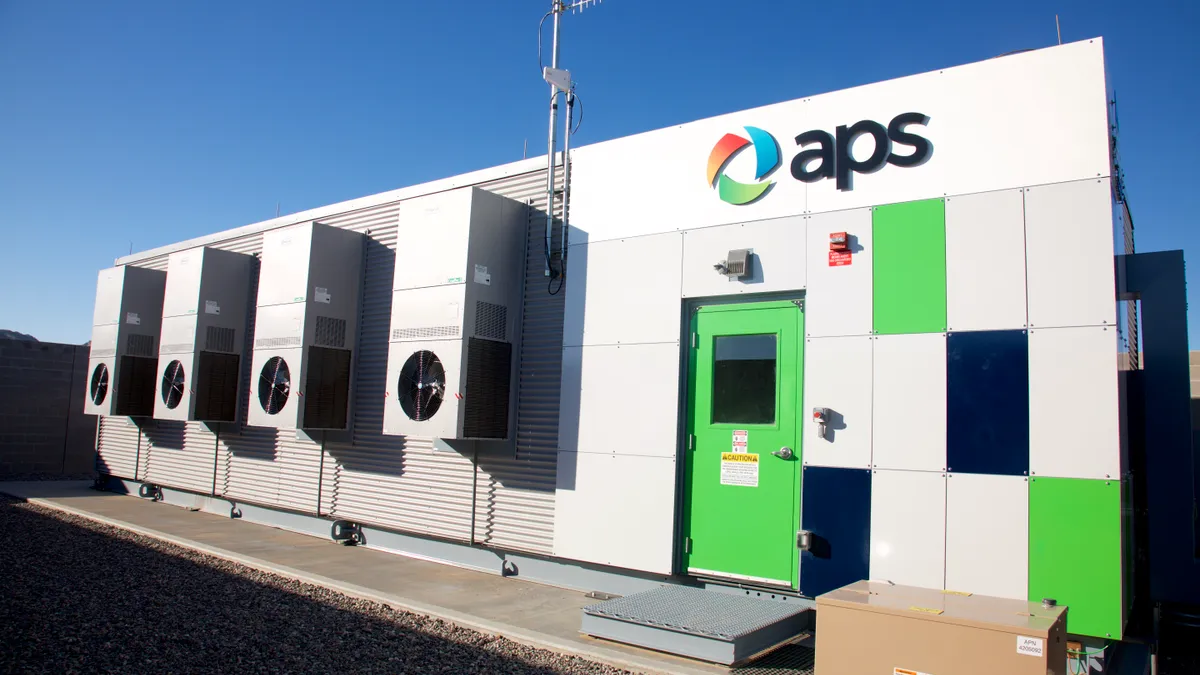UPDATE August 6, 2019: The brief has been updated with comments from Fluence, the operator of the energy storage system.
Dive Brief:
- Democratic Commissioner Sandra Kennedy raised concerns on Friday about the use of lithium-ion battery chemistry in the wake of Arizona Public Service's (APS) battery storage fire on April 19.
- Kennedy acted independent of the other four members of the Arizona Corporation Commission (ACC), having previously expressed interest in opening an ACC investigation into lithium-ion chemistries. Her letter, part of the commission's docket on the fire with a 2 MW, 2 MWh lithium-ion storage system at APS' McMicken substation, outlined the risks of lithium-ion and offered other battery substitutes for a larger deployment of storage.
- Investigations into the APS fire at the McMicken facility are ongoing, including internally at APS. However, Kennedy's letter cites lessons learned from a 2012 lithium-ion fire at APS' Eldon Substation, concluding that utility-scale batteries using those lithium-ion chemistries "are not prudent and create unacceptable risks."
Dive Insight:
APS has committed to the rollout of a landmark 850 MW of energy storage and at least 100 MW of solar by 2025. The utility intends to follow through on deployment plans despite the McMicken fire. However, the energy storage industry is watching closely.
"The commission is right to ensure that energy storage installations of all types are safe, reliable and cost effective for consumers. In fact, all assets deployed and operating on the grid must meet these requirements," Kelly Speakes-Backman, president of the Energy Storage Association, told Utility Dive via e-mail.
"As large-scale investments are made, it would be prudent and advisable to invest in utility scale energy storage systems that are sustainable, less risky, and do not utilize chemistries that have a potential to release hydrogen fluoride in the event of a fire or explosion," Kennedy wrote in her letter.
She referred to hydrogen fluoride, a poisonous gas that can be created when lithium-ion batteries degrade and decompose during a fire. While lithium-ion prices continue to fall, she identified other types of storage, including non-battery energy storage that has become price competitive.
Kennedy said liquid metal batteries include "cheap, abundant raw materials, very safe operational characteristics and an ability to go through many charge-discharge cycles without degradation." She also recommended batteries that include zinc air, magnesium and nickel-iron batteries, based on the abundance of the minerals and reduced toxicity compared to lithium-ion.
"There are other utility scale battery technologies that are available that are far more sustainable and do not have these risks. There are also other lithium ion batteries that utilize chemistries that do not carry the same risks as those involved in the Eldon Substation and McMicken incidents," Kennedy said in her letter.
ESA launched a Corporate Responsibility Initiative this spring, with commitments from utilities like Duke and Eversource, "to elevate best practices in the energy storage supply chain," Speakes-Backman said.
Kennedy did not respond to questions about next steps to address her concerns or about possible support within the ACC for an independent docket on battery safety.
McMicken is one of three large-scale lithium-ion battery programs currently deployed by APS, along with its Festival Ranch 2 MW, 2 MWh system and its Punkin 2 MW, 8 MWh system. All three systems are within 100 miles of downtown Phoenix, and are operated by Fluence, a joint venture of AES and Siemens. AES initially installed the McMicken storage system.
"There are 9,000 megawatts of energy storage in operation around the world, using these [lithium-ion] cells in safe, controlled, pre-engineered environments," John Zahurancik, Chief Operating Officer of Fluence, told Utility Dive via email. "All electricity generation, distribution, and transmission technologies bring a measure of risk that requires careful operation and appropriate layers of safety. Lithium-ion based energy storage has been proven safe through years of operation, and utilities around the world have made it a critical part our energy mix."















